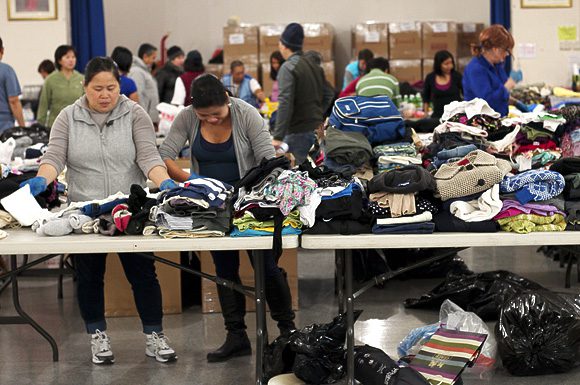Devastation in their homeland, determination here.
In the aftermath of one history’s worst recorded storms, Typhoon Haiyan, Filipino-Canadians have been quick to pick up the pieces with Toronto-wide aid drives.
Tuesday Canada sent the Interdepartmental Strategic Support Team (ISST), as well as the Disaster Assistance Response Team (DART) to the region.
Locally, at Our Lady of the Assumption Parish and Catholic Church, a centre for Filipino Catholics in the GTA, volunteers came out yesterday early to pack clothing, canned foods and other basic necessities bound for the storm ravaged archipelago.
Vengielyn Relles, a volunteer at the donation drive who has family in the Philippines, says she volunteered today because she wanted to do her part to help.
“It’s very difficult. For me, I’m very lucky, I’m here in Canada, but being here knowing thousands back home are suffering is so hard.” Her family, she says, has escaped harm.
Nancy Bobala, who lives in Bradford, came out to donate goods to the relief effort. She took Go Transit just to come out to help.
“This can happen anywhere. If you’ve got the resources, food or some clothes that you believe can be used, come down and donate because it’s humanity coming together to help around the world,” she said.
Neil MacCarthy, director of public relations and communications for the Catholic Archdiocese of Toronto, says the fundraising efforts in Canada is huge for the Filipino expatriate community.
“We have folks that have come together and when you feel helpless and you’ve got loved ones overseas and you don’t know what to do people come together.
“They rally together. They’re donating clothing and other items that will be shipped over there,” MacCarthy said.
And while material donations, such as clothes, are crucial to the relief efforts, MacCarthy says financial donations are the most efficient way to get aid.
“The cost of shipping or problems at the customs at the border those kind of things mean that they never end up at the final destination. Frontline relief agencies have always told us the cash is the fastest most efficient way to get [help] over there.”.
For Relles, contributions from Torontonians have made all the difference:
“I’m so happy. I can see it …. everywhere. This is my first time volunteering here and I’m just so glad seeing all this stuff.

